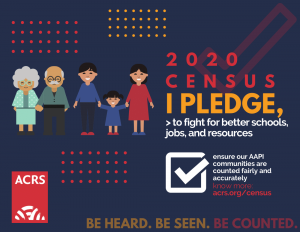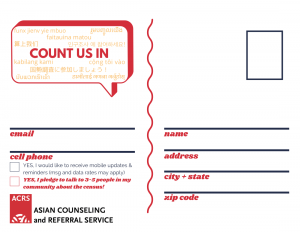
Every 10 years, the U.S. government counts every person living in the country through the census. The census is a short questionnaire that asks basic information about your household and the people who live in it. Each home will receive an invitation to respond to the questionnaire starting March 12, which they can fill out online, by phone, or by mail. Your response to the census will be kept fully confidential.
The census helps shape so many aspects of the communities we live in – schools, roads, hospitals, and even social programs. Being counted helps ensure Asian Americans and Pacific Islanders (AAPIs) and other communities on the margins get the fair share of resources and representation we deserve! AAPIs have been undercounted in the census for decades due to institutional and cultural barriers, leading our communities to historically lose out on vital resources and opportunities. We already have to fight for our visibility every day, and we refuse to let another census pass by without us being seen.
Why Fill Out The Census?
Being counted in the census helps you and your family
Data from the census is used to divide over $1.5 trillion dollars of government funding to states for important services like schools, libraries, roads, food stamps, and Medicaid. Census results also determine the number of seats each state will have in Congress and is used to draw congressional and state legislative districts. When communities are undercounted, they risk losing the full potential of their political power.
Your census responses are completely confidential
The strongest protections in the history of the census are in place to ensure personal information is kept confidential. Your answers can only be used to produce statistics — they cannot be used against you in any way. Responses are safe, secure, and protected by federal law. The census will NOT ask about citizenship or immigration status. The census will only ask about basic demographic information like name, age, sex, date of birth, and race of all people in living in a household.
Participating in the census is quick and simple
The census only has 7-9 demographic questions about every person living in the household and will take just a few minutes to fill out. While we highly encourage filling out the census as soon as possible, you have until August 14 to respond.
You can respond online: The Census Bureau will send you a unique code and instructions by mail which will allow you to fill out the census form online. If you don’t have the code, you can still put in your address and fill out the form. You can fill out the census online at www.2020census.gov. More languages are available at the bottom.
You can respond by phone: Call the Census Bureau to answer the census by phone. You can call 844-330-2020. Available in multiple languages here.
You can respond by paper form: If you do not respond to the census online or by phone, the Census Bureau will mail you a paper questionnaire that you can fill out.
You can respond to the census online or by phone through August 14, 2020; however, starting in May 2020, a census employee might come to your home to ask for the information in person if you have not yet responded.
Language assistance is available for some languages.
The online questionnaire and telephone assistance are available in Spanish, Chinese, Vietnamese, Korean, Russian, Arabic, Tagalog, Polish, French, Haitian Creole, Portuguese, and Japanese. The Census Bureau has language guides available in 59 non-English languages at https://2020census.gov/en/languages.
中文 – Chinese Simplified |中文 – Chinese Traditional |ગુજરાતી – Gujarati | हिंदी – Hindi | hmoob – Hmong | 日本人 – Japanese | 한국어 – Korean | ខ្មែរ Khmer | ລາວ – Lao | Native Hawaiian & Pacific Islander |नेपाली – Nepali |ਪੰਜਾਬੀ – Punjabi |Tagalog | ไทย – Thai | Tiếng Việt – Vietnamese |Urdu-اردو | Español – Spanish | عربى – Arabic
Census FAQs
Why should I fill out the census? How does it impact me?
Census data help ensure your family and community are able to thrive. Census data directly affect how more than $1.5 trillion in federal funding is allocated yearly to communities for schools, roads, and hospitals, as well as vital social programs such as Medicaid, Headstart, and the Supplemental Nutrition Assistance Program (SNAP). Census data are also critical to ensuring your voice is heard in our political system, as the data are used to determine how many seats in the U.S. House of Representatives each state gets and to redraw political districts at all levels of government.
Are my responses to the census safe? How is my information kept safe?
All census information is confidential. By law, the Census Bureau cannot share an individual’s information with anyone, including other government agencies and law enforcement entities. Federal law protects your information. The Census Bureau is bound by Title 13 of the U.S. Code, which has strong confidentiality protections for census data. Every person with access to your data is sworn for life to protect your information. If anyone violates this law, it is a federal crime; penalties are severe, including a federal prison sentence of up to five years, a fine of up to $250,000, or both. Additionally, responses collected by the Census Bureau are used for statistical purposes only. The Census Bureau publishes only aggregated statistics and may not publish information that would identify an individual, business, or organization. Federal, state, and local government agencies are prohibited from using statistical datasets produced by the Census Bureau to the detriment of any individual who responded to a census.
Who will get the 2020 Census form?
In 2020, households will be able to respond to the census with a paper form, online, or by phone. In March 2020, census materials will be mailed in three waves over approximately one week. Eighty percent of homes will receive a letter inviting them to respond online, and 20 percent of homes will receive a paper census form in the first mailing. Federal law requires that everyone participate. All homes will get a language assistance sheet with toll-free phone numbers providing multilingual assistance, and anyone can fill out the census by phone. Language assistance is available on the internet and by phone in 12 non-English languages, and language assistance in the form of printed and video guides will be available in 59 non-English languages. The paper form, however, will only be in English and Spanish.
What will the 2020 Census ask me?
The 2020 Census form asks 9 questions. Questions include: name, sex, age and date of birth, race, Hispanic origin, how the people in the household are related to each other, and whether the home is rented or owned. The form will NOT include a question on citizenship. The data collected are protected by confidentiality laws and cannot be shared by the Census Bureau with other government agencies or law enforcement entities.
How do I fill out the census?
For the first time, people will have an option to complete their census form online. The Census Bureau will encourage everyone who can to respond using the internet, but paper forms will continue to be available. Households with indicators of low internet access or use will simultaneously receive the paper form and information about responding online. In addition, people will be able to report their answers by phone.
How do I identify a census worker?
Census workers have ID badges which contain a photograph of the field representative, the Department of Commerce watermark, and an expiration date. They will provide you with supervisor contact information and/or the regional office phone number for verification, and a letter from the Director of the Census Bureau on Census Bureau letterhead. They may also carry a laptop and/or bag with a Census Bureau logo.
Historically undercounted groups are at a higher risk of not being fully counted in the census, and have been for decades. Roughly one in five Asian Americans and one in three Native Hawaiians and Pacific Islanders live in undercounted areas, making our communities – especially those who have limited English skills and/or are low income – at risk. Being disproportionately undercounted means our families, communities, and neighborhoods lose out on our fair share of public and private resources as well as political representation.
Misconceptions About the Census
Misconceptions about the census can stop people from participating in the census. The most common misconceptions about the census are that the data are used to locate people living in the country without documentation, used by the FBI and police to keep track of people who break the law, or shared with landlords. These are misconceptions that you should address with your communities. All census information is confidential. By law, the Census Bureau cannot share an individual’s information with anyone, including other government agencies, law enforcement entities, and landlords.
There are also misconceptions about who should participate in the census. Everyone should be counted regardless of age, race, religion, or immigration status. There has historically been an undercount of children under age 5, and children should be counted in the census. There are also misconceptions about who should be included in the census form. Everyone who lives in a household — even if they are not related to each other — should be included in the census form. While the census requires mandatory participation, historically respondents have skipped questions and have still been counted during that census.
Resources
- Americans Advancing Justice’s 2020 website: Count Us In 2020
General resources, including Asian language translated materials
Native Hawaiian Pacific Islander Resources
Why the 2020 Census Matters for Asian Americans, Native Hawaiians, Pacific Islander Communities
National Factsheet | Simplified Factsheet | State Factsheets (Including all 50 states plus the District of Columbia)
- Census 2020 GOTC (Get Out the Count) Toolkit
Download this comprehensive toolkit on community engagement and communication tips for GOTC efforts.




